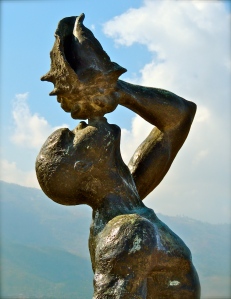It’s hard to believe that a mere 48 hours has passed since I was in Haiti.
The transition between that country and my own has been surreal, to say the least. To abruptly go from such a powerful emotional and social experience back to the regular routines of daily life was a little harder than I anticipated. I was only partially present as I sat through my classes, caught up with friends and went through the other motions of a typical Tuesday. Part of me was still in Haiti.
I’ve been struggling with the best way to put the experience into words. At first I was hesitant to try, because I know that no matter how eloquently I describe it I still won’t be doing it justice. But I come from a family of writers and I’ve been taught that the best way to process and understand something is to write it out. So here’s my best shot.
I thought I understood what poverty looked like. I thought I understood global systems of oppression, social inequality, and the consequences of broken government structures. These things have been clearly articulated to me in my college and high school classes and as a student at a liberal university with a school that’s literally named for international service, I know theories about international development better than my own alma mater. I have been challenged several times throughout my academic experience to uncover and accept the inherent privileges that my skin tone, socio-economic status and nationality have allowed me.
But nothing impacted my conception of these issues the way this experience did. To actually see the things I had only ever read about or discussed in class – to actively observe and question and reflect – profoundly challenged and changed my perspective.
I was struck by how lucky I am for the opportunities I’ve been afforded, how grateful I should be for the life I’ve led. Spending a few days with a hole in the ground as my only bathroom has made me inordinately excited about flushing toilets and indoor plumbing. Hearing one man’s nightmare story about a painful ambulance ride down a mountain with no paved roads has made me feel foolish for ever having complained about a bi-annual doctor’s check-up. Learning about the incredible obstacles that stand in the way of Haitian youth and a good education and the hard work and ingenuity of those individuals who have managed to get theirs has doubled my appreciation for the education I was given. It’s inspired me to someday use it as a means by which to combat the institutions that have created such unfairness.
At the end of my time in Haiti, I was exhausted. I had been challenged physically, emotionally and intellectually. But I was also invigorated. I am in awe of the individuals I met there. I am excited by the successes of the grassroots organizations we partnered with, which I have now seen with my own eyes. I am outraged by the blatant disparity, by the UN workers who patrol peaceful towns in armored vehicles, and by every bag of rice or sugar – two of Haiti’s staple crops that should be produced and sold by them – stamped with the logo “Made in the USA”. And I am touched and moved by the strength, intelligence, kindness, rebelliousness and hospitality of the people.
Haiti can break your heart and make it swell with happiness within the same moment. It makes you want to turn your head and look away and it makes you stare in rapture. It cannot be condensed to fit neatly into a New York Times op-ed. Images and footage of it looks good on television, but it doesn’t show you very much at all. The history and theory I’ve learned in my classes don’t come close to explaining it, no matter how convincing the professor made it sound at the time. And if Pulitzer Prize winners, famous news anchors and academic scholars don’t get it right, I’m not sure if I’ll do much better. All I can say for certain is that Haiti is a country that gets its hooks into you, whether you want it to or not. And it filled me with hope – even though most of the narratives told about it suggested that hope was the last thing I would find.
I came to Haiti searching for a way that I could help. But now I don’t think help is really what Haiti needs, at least in the way help has traditionally been understood. Instead, I think Haiti needs understanding. It needs a new narrative. As one of our hosts told us on the day before our departure, my peers and I were given the chance to see that the “myth of Haiti” is not true. She thanked us for coming to search for what was. And when I asked, perhaps naively, what we were supposed to do with that knowledge, she suggested that we take our experience as a reminder to question our concepts of different people and places, especially those that are depicted badly – and that the next time we face certain stereotypes, we remember Haiti.
I don’t think that Haiti is done with me yet. But for now, I’m going to try to live by those parting words. And I hope that from here on out, no matter what misconceptions I’m tempted to fall under, I will always remember Haiti.
